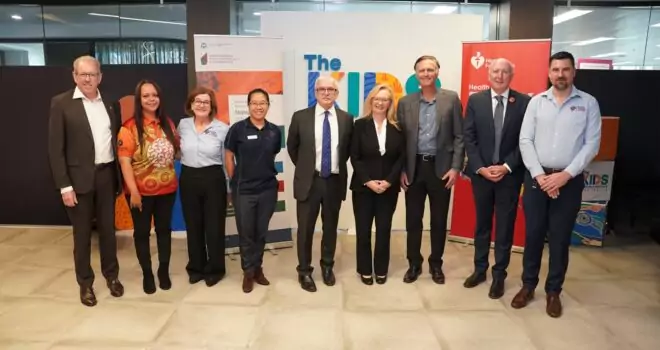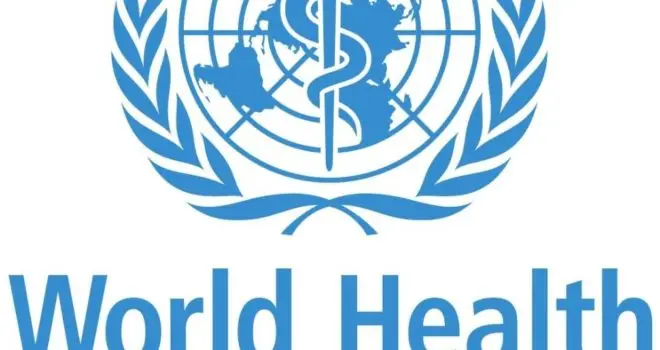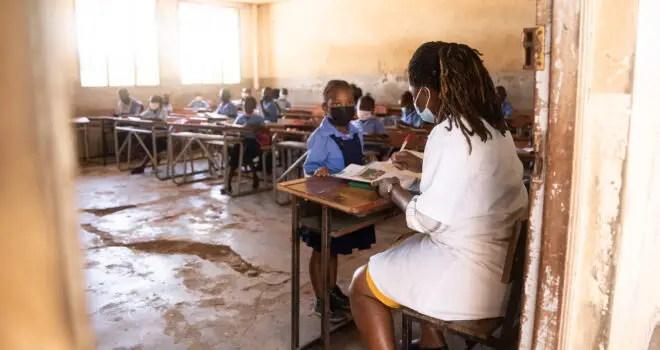Geneva/Singapore July 19, 2023: The World Heart Federation (WHF) and Philips Foundation announced today a ground-breaking partnership to promote awareness, medical training as well as early diagnosis and treatment of Rheumatic Heart Disease (RHD) in Asia Pacific (APAC).
The partnership, which will start in the Philippines, aims to provide over half a million Filipino children at risk with access to healthcare facilities equipped with trained personnel to diagnose the disease. 190 Regional Health Units (RHUs) providing primary care to a population of over 5 million will have healthcare workers trained in Rheumatic Fever/RHD clinical pathway. 6,000 children in the Philippines will also be screened for RHD using Philips’ innovative handheld point-of-care ultrasound device (POCUS). Additionally, around 200 teachers will be educated on RHD leading to greater disease awareness that enables the children and young adults at risk to seek early diagnosis and treatment.
The pilot project, launching this year and extending until June 2025, targets a combination of challenges – low disease awareness, lack of healthcare access and treatment, inadequate diagnosis, and inadequate medical training – to drive a comprehensive approach to alleviating the burden of RHD. The project also carries the support and cooperation of the Philippines Ministry of Health, which ensures alignment with the existing healthcare system, contributing to its long-term sustainability.
“Our partnership with the World Heart Federation aims to drive improved early detection and treatment of rheumatic heart disease, while demonstrating the sustainability and cost-effectiveness of this innovative approach in the Philippines,” said Margot Cooijmans, Director of the Philips Foundation. “Rheumatic heart disease remains a pressing issue in underserved regions across the globe, largely overlooked in the global health agenda. The lack of attention and resources in these settings prompts us to ensure that these communities are not left behind as they battle a disease that has already been eradicated elsewhere.”
RHD is a significant health issue affecting an estimated 40 million people worldwide, primarily adolescents and children. In the Asia-Pacific region, the prevalence and mortality rates are particularly significant, and the Philippines is among the higher-burden countries, with an estimated female age-standardized prevalence between 348 and 508 cases per 100,000.
For effective diagnosis of RHD, POCUS, a handheld ultrasound solution offers a variety of benefits. This device has been shown to be far more sensitive in diagnosing RHD than traditional cardiac screening with a stethoscope that is used in most resource-stretched settings where ultrasound is not available at the primary care sites. This device eliminates delays in traditional diagnosis and treatment, as well as additional expenses for patients who needed to travel to hospitals for proper diagnosis.
The project will run in three high prevalence areas of the Philippines: Taguig Global City, Iloilo, and Bicol, and includes intensive training and education for local healthcare workers on handheld echocardiographic screening, RHD clinical pathways, and benzathine penicillin administration. 20 RHUs providing primary care will be equipped with POCUS, allowing patients at risk to be referred to an RHU equipped with a POCUS for further detection.
“The partnership showcases a strong commitment to education and training of healthcare workers, ensuring that they are equipped with cutting-edge technology for RHD detection,” says Professor Liesl Zuhlke, Vice-President of the South African Medical Research Council, Paediatric cardiologist and RHD researcher, and World Heart Federation Board Member. “Our goal is to set a precedent for the Asia-Pacific region and the world.”
The project’s innovative decentralized model of RHD care allows children diagnosed with RHD to receive follow-up treatment within their local community. This approach ensures that the treatment model is sustainable and respects existing healthcare infrastructure, a critical factor for the success of this model in other parts of the world.
This partnership will provide further evidence of the benefits of POCUS use for RHD and an example which can be implemented elsewhere in the region. The World Heart Federation and Philips Foundation look forward to sharing preliminary findings at the inaugural World Congress on RHD in Abu Dhabi in November 2023. This gathering offers an opportunity to unite the global RHD community, disseminate the latest findings, and discuss their implementation.
“We are confident that the insights gleaned from this project will contribute significantly to the global understanding of Rheumatic Heart Disease and serve as a stepping stone to further partnerships and initiatives,” adds Professor Liesl Zuhlke.
ENDS
About the World Heart Federation
The World Heart Federation is an umbrella organization representing the global cardiovascular community, uniting more than 200 patient, scientific and civil society groups. Together with its Members, WHF influences policies, shares knowledge, and inspires behaviour change to achieve heart health for everyone.
About the Philips Foundation
Philips Foundation is a registered non-profit organization established in 2014 – with a mission to provide access to quality healthcare for underserved communities across the globe. By leveraging Philips’ capabilities and combining them with the experience and expertise of non-governmental organizations and other community-focused and impact-driven enterprises, Philips Foundation helps create innovative pathways to open up affordable healthcare for communities most in need. By also partnering with innovative social entrepreneurs rooted in the local ecosystem, Philips Foundation aims to increase access to healthcare for 100 million people a year by 2030. More information can be found at www.philips-foundation.com
For further information, please contact:
Media Contact: Borjana Pervan, Director of Strategy and Communications, World Heart Federation
Borjana.Pervan@worldheart.org


